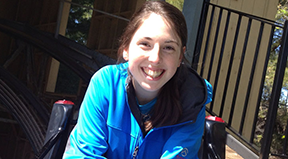
My name is Katie. I am a program manager (PM) for a user experience team at Microsoft. I manage software features, rather than people. PMs work in “feature crews” with developers and testers to oversee the creation of features in our products. The PMs on my team own the user interfaces (UI) that are common across Office programs. I also own a few aspects of the UI that are brand new for the next release of Office–so unfortunately I can’t say much about that!
Another area that I own is called telemetry. When users first open Office, they can opt to send us information about how they use the product. We collect and analyze this data to understand users’ feature and command usage patterns, which helps us validate our design decisions and plan for the future. For example, telemetry can show us which styling options are the most common in Word. We can then be sure these commands are easily accessible. Communication is a big part of my job–especially with other teams such as the App teams that work on Word, Excel, and PowerPoint and the Windows team.
How did you get interested in computing?
In my first computer science class in high school, I always found it so cool how my simple lines of code could create things. After a year of Intro to Java, I thought about my favorite Nintendo games and what the code behind them might be like. Unfortunately that took a little bit of the magic out of the games for me... but at the same time made me realize how coding could make such cool stuff! In my current job I'm involved more in the design and user experience side of computing—not so much the coding—but I still appreciate how cool it is that code can make things happen I would never have expected.
How did you end up in your current position?
Before joining Microsoft, I went to Olin College in Needham, MA, where I earned a degree in engineering with a concentration in computing. Olin is a small school that prides itself in its innovative approach towards engineering education, with a heavy focus on design and entrepreneurship. Some have said that Olin students are great for the Microsoft PM role because the coursework and hands-on projects help students acquire technical skills, a good eye for design, and good collaborative and communication skills.
I was lucky to have found a few great summer internship opportunities while at Olin, working at IBM and then at the University of Washington (UW). At IBM I worked in an electronics lab manufacturing printed circuit boards. While it wasn’t exactly what I wanted to do when I graduated, I learned a lot that summer and it gave me a taste of what a career could be like in industry. At the UW, I did some design and coding, working with Anna Cavender and Richard Ladner on assistive technology for deaf students in mainstream education classrooms. I really enjoyed that work, and that summer I was able to visit a lot of Seattle-based software development companies, including Microsoft. The summer really opened my eyes to all the cool things that could be done with a computer science background.
Does your disability affect your career?
I am hard of hearing and rely primarily on lip-reading. At Microsoft my coworkers have been nothing but supportive, and they are willing to accommodate me by facing me, speaking clearly, and repeating themselves. My manager has expressed that he is excited to have me on the team and has seen my hearing impairment as a way for the team to grow and learn to be better communicators.
For meetings, I’m able to schedule either remote or on-site captioning at no cost to my team or to myself. Microsoft also offers free interpreting, though I don’t use sign language very much. However, I’m very glad to say that I (as well as some of my coworkers) have taken the free American Sign Language classes on campus!
Although I benefit from captions and supportive coworkers, I still face challenges. For instance, I sometimes feel frustrated at not being able to notice or listen in on hallway chatter. I consider myself fortunate to work alongside other smart people who are working on exciting things, so I always love to soak up any information I can. Over time, people have learned to grab me if the chatter might related to something I'm working on, so I won’t miss anything critical. Aside from that, coworkers actually tell me I am lucky that I don’t have to be distracted by the noise outside. However I still think I'd prefer to have the option to listen in on everything—in my mind it feels like unlimited free knowledge!
Why should I study computing?
Talent in computing is in high demand. Just looking around at all the cool things going on at my own company makes me so excited about where technology is headed in the future, and we will need people to help bring these ideas to life. If you’re interested in a career in computing, I’d recommend being aware of the computer science classes available and taking the ones that are interesting to you. I went to a humanities-based high school that offered two computer science classes: Intro to Java and Advanced Placement computer science. I took both and enjoyed them a lot!
Remember that computing doesn’t necessarily have to mean hard coding. In my job I’m working on a software product, yet do very little coding. Yes, I have a lot of technical knowledge that is necessary for me to do my job, but I primarily interact with others and spend time thinking about the user experience.